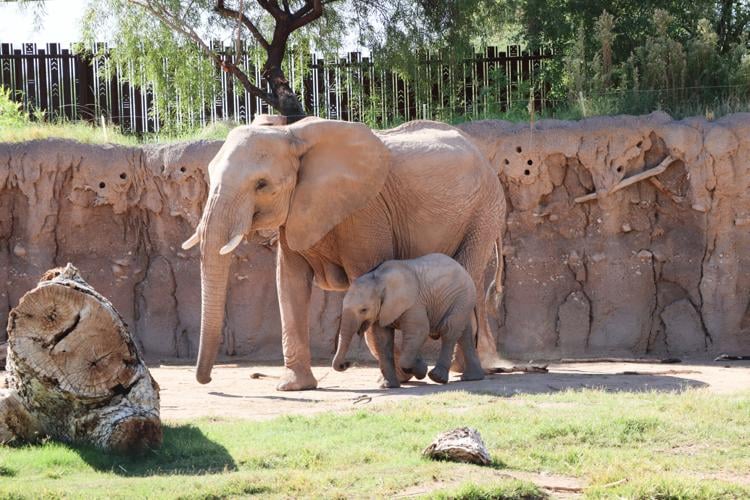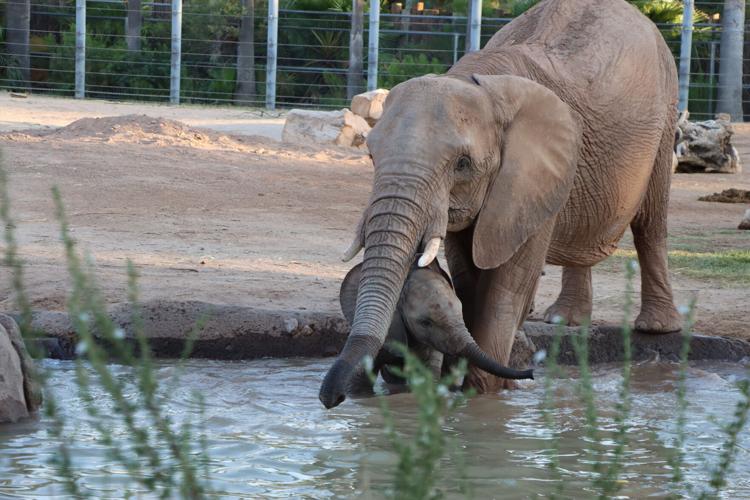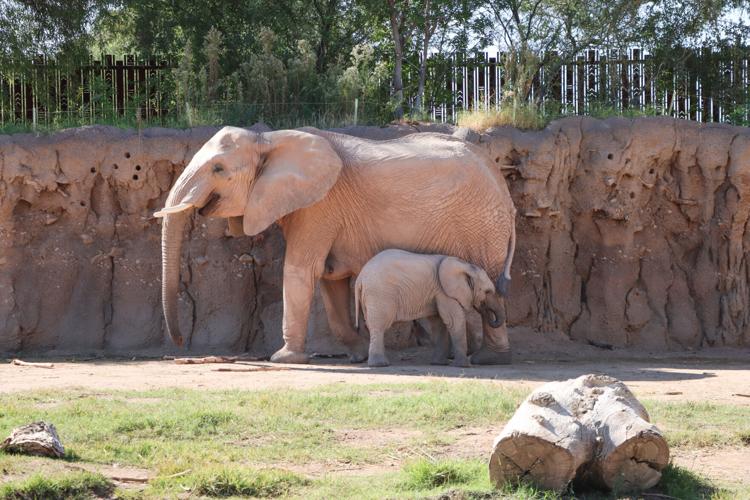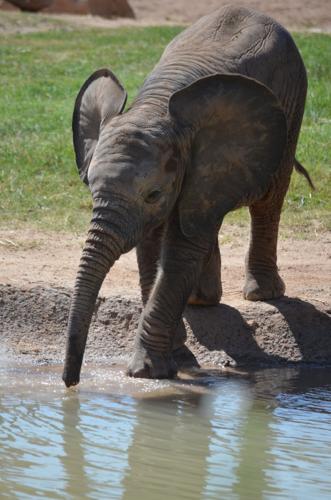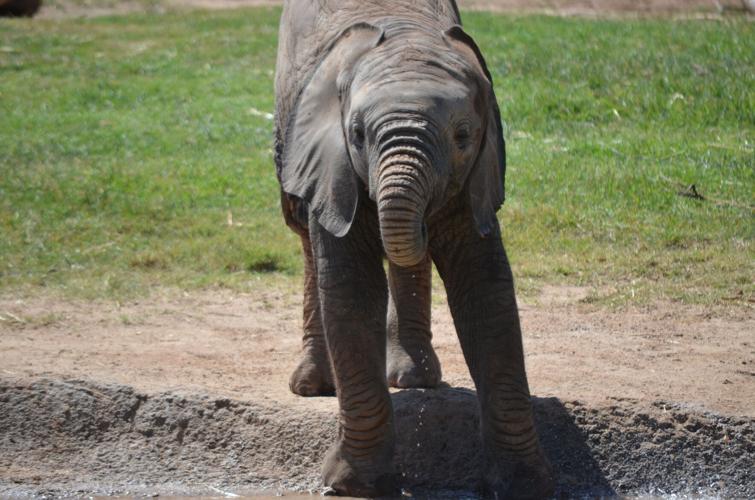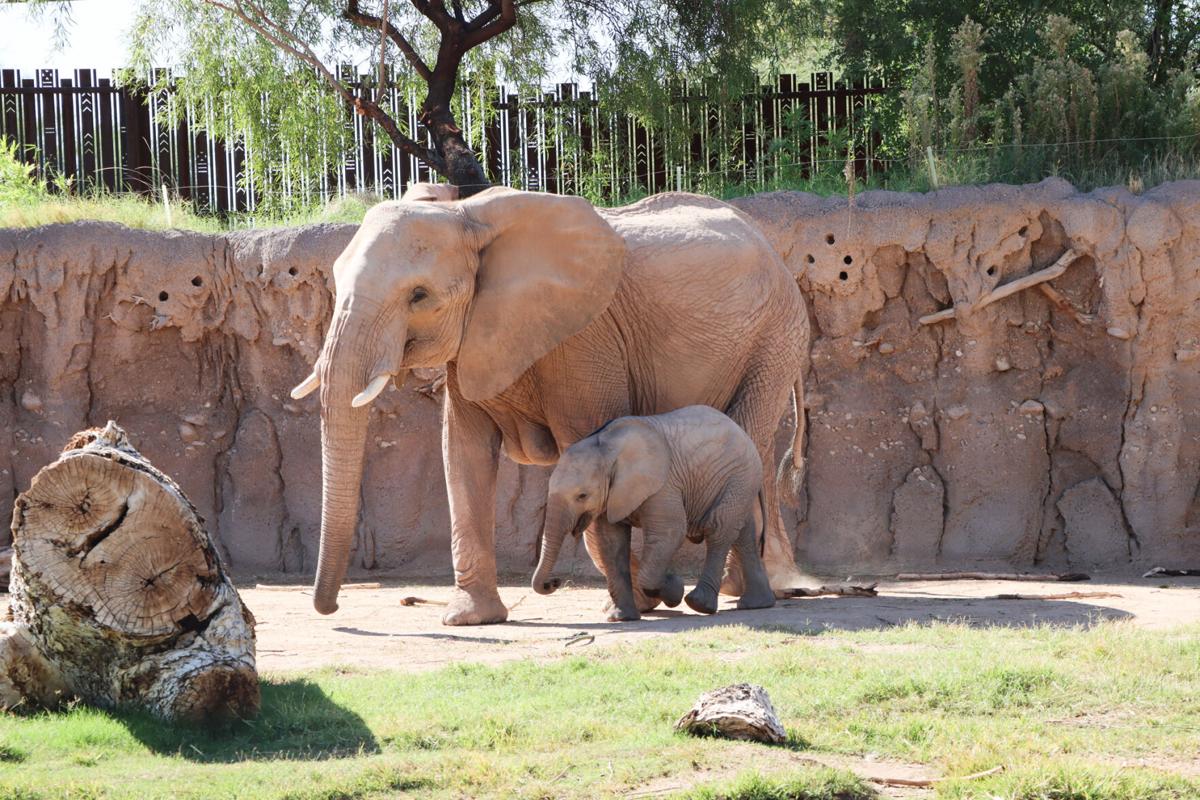Month after month, I ask the same question.
“Are there any particularly cute moments with Meru that you’d like to share?”
And month after month, the question tends to stump the zoo staff.
“She’s just cute always,” lead zookeeper Shelby Maerling said this time.
Elephant calf Meru was born at Reid Park Zoo, 3400 E. Zoo Court, to African elephant Semba on March 8. She joins allomother Lungile and big sisters Nandi and Penzi.

At 7 months old, Meru's favorite food is grapes, though she's interested in whatever the other elephants are eating.
Maerling has been at Reid Park Zoo for the births of all three elephant calves, becoming part of the team as an apprentice just one month before Nandi was born in 2014. She was there for the birth of Penzi in 2020 and now she’s watching 705-pound Meru grow up.
“I started off really wanting to be a veterinarian from as soon as I could talk,” Maerling says. “I actually took horseback-riding lessons at the Phoenix Zoo and I said, ‘What can I do now?’ And they said, ‘You can come back in a few years and volunteer.’ Little kid Shelby took that very seriously.”
Over the years, she fell in love with the connection between animals and opted for a profession that wasn't as focused on the medical side of things.
“My favorite thing about the job is the relationship (you build). There’s so much trust there and we’re able to do incredible things with the animals. It’s (through) positive reinforcement and it’s voluntary and they’re doing it because they have trust in you. I think that’s so incredible with any animal you’re working with,” she says. “For elephants, they are iconic and so charismatic. I think it’s incredible to be so close to them and watch people see them for the first time or the 100th time and be so amazed. That impact is so fun to watch.”

Meru is being more intentional with her trunk, using it to not only pick up food but to spray herself with water.
Keepers facilitate training sessions with each of the elephants, which are always voluntary for the herd. Training allows staff to ensure the health and well-being of the elephants.
In the last couple months, Meru was learning how to stand still and listen to cues in the event of blood draws, which happen in the ear — the thinnest part of an elephant’s body and the easiest area to see the vein. Blood draws can take the assistance of three people, including trainers and a veterinarian. Keepers have worked with Meru to make sure she’s comfortable around multiple people.
“Her attention span has really increased and she has become way more focused on her training sessions,” Maerling says. “She’s really quick to come over and engage with us. She knows how to present her ear when we ask for her ear. She lets us touch it and have multiple people around her ear and (she sees) that it’s not scary. She’s really confident in it.”
This particular training milestone is an important building block, Maerling says. Next up, keepers might work with Meru on presenting her feet for routine pedicures. But trainings are always tailored to the individual elephant.
“A young calf like Meru is with her mom, so she’s learning a lot by watching Semba,” Maerling says. “Sometimes, naturally (Meru will) be doing the same things (as Semba), so you can take the opportunity to teach the behavior they’re already mimicking.”

Zoo staff call Meru a social butterfly, as she likes to spend time with everyone in the herd.
Because training is done through positive reinforcement, Meru always gets a reward. Lately, grapes have been the shiny prize.
“Because she is doing more training now, we are even more dialed into what she thinks is the tastiest thing,” Maerling says. “Grapes are really the tastiest thing in the whole wide world for her. She is so invested in getting those grapes.”
During training sessions, if keepers give her something that isn’t a grape, Meru will drop the unwanted snack on the ground and put her trunk back out — patiently waiting for the fruit she actually wants.
“She thinks it should be grapes always,” Maerling says.

Elephant calf Meru loves to swim and spend time in the mud wallows.
While Meru loves swimming and hanging in the mud wallows, she's also become more interested in eating. When she isn’t in a training session, she loves lettuce, hay and anything else the other herd members are eating.
“She’s still nursing and she’ll continue to do so for likely a couple years, but she’s showing a lot of interest in the grown-up foods,” Maerling says.
A few months back, Meru's trunk was still operating as a floppy noodle and she’d face-plant into the food she wanted to eat. But not anymore.
“She got the motor control (of her trunk) down. Now she’s got the appetite down,” Maerling says. “Because she does have the motor control in her trunk now, we’re seeing her be really intentional with her trunk — not just to drink water but throwing it on herself.”
It is admittedly a tiny amount of water, but it’s water no less. Elephants use water and mud to help cool off — mud also acts as insect repellant and sunscreen.

Meru loves swimming and hanging in the mud wallows.
From the jump, 10-year-old Nandi was completely enamored with Meru. That wasn’t always the case for 4-year-old Penzi, but she’s definitely warmed up to the big sister role.
“She definitely has some moments where she’s less than thrilled Meru is there, but we do see her standing over Meru when she’s sleeping to make sure she’s OK,” Maerling says. “I think every middle child can probably relate to having a little sister. She’s doing great and we’re very happy with them. Just today, everybody was in the wallow and there was a lot of trumpeting and running around and zoomies.”
“Meru has so much enthusiasm for everything — she wants to play with every toy, she wants to play in every mud puddle, she wants to splash in the pool,” Maerling says. “Everything she does, she does with so much zest.”

Meru was born March 8, joining a herd that includes Semba, Lungile, Nandi and Penzi.


